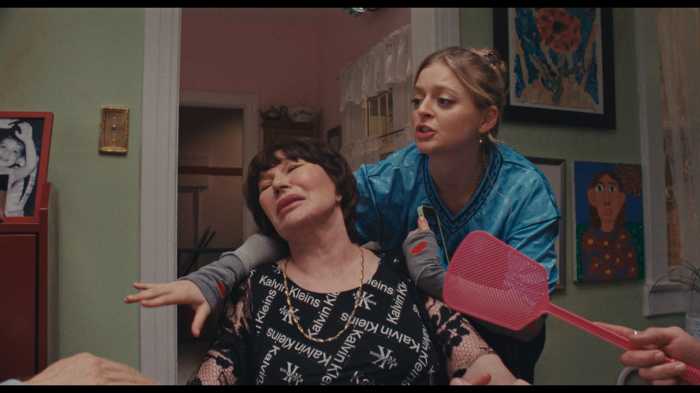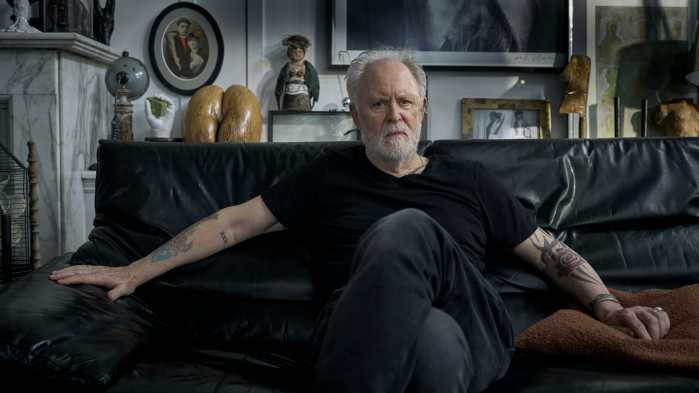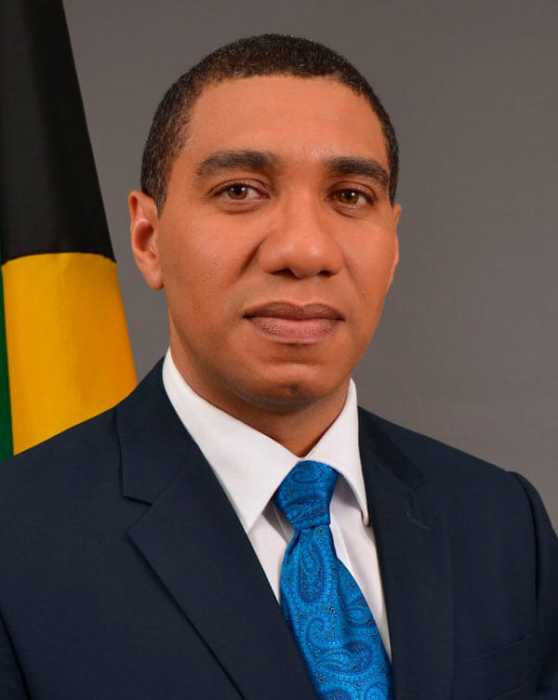It’s Pride month, and a half dozen films plus three TV series are available to stream this month. Each celebrates and reflects on LGBTQ life and love. Here is a rundown of what to watch.
“4 Days in France” (OVID)
“4 Days in France” is French filmmaker Jérôme Reybaud’s dazzling feature debut about Pierre (Pascal Cervo), driving off in his white Alfa Romeo letting chance and Grindr be his guide. He has left his lover, Paul (Arthur Igual), in the middle of the night without a word. Reybaud never explains what prompts the departure, and Pierre does not reveal much as he encounters a variety of men and women on his journey. Paul, in low-key pursuit, is as determined to find Pierre as he is troubled by his lover’s absence. Reybaud’s sensual road movie tracks these two men, both full of longing, on their parallel journeys through the gorgeous French countryside. Along the way, there are sexy assignations and hypnotic driving scenes.
“Fanny: The Right to Rock” (PBS)
“Fanny: The Right to Rock” is an enjoyable documentary about the all-female rock band comprised of Filipina American and queer women. The group made a splash in the late 1960s and continued to perform until their breakup in the mid-1970s. As the film shows, these women were pioneers who never got the fame they deserved because of sexism in the music industry. Their music was also ahead of its time, and this documentary emphasizes that the music industry never gave them the support they needed to have a hit record or song. “Fanny: The Right to Rock” lovingly celebrates the band as these women, now in their 60s, prepare to release a new album, showing that their music lives on and remains relevant.
“Drag Me to Dinner” (HULU)
“Drag Me to Dinner” is a comedy contest show about two pairs of drag queens cooking and drinking. “What could possibly go wrong?” deadpans judge Bianca Del Rio. Hosted by Murray Hill and produced by and starring Neil Patrick Harris and his husband David Burtka, each episode has a theme, such as “Tropical Kiki,” where contestants Jinx Monsoon and Bendelacreme compete against Jackie Beat and Sherry Vine to host a dinner party offering food, drinks, and entertainment. The double entendres fly fast and loose — the Pu Pu Platter talk is appropriately juvenile — and hunky helpers provide assistance. The dinner parties are the highlights, and the bitchy zingers provide just desserts.
“With Love” (June 2, Amazon)
Season 2 of this series about the extended Díaz family opens on Christmas Eve, with one of the three grandchildren getting engaged. Will Miles (Todd Grinnel) propose to his trans girlfriend, Sol (Isis King)? Or will Henry (out gay Vincent Rodriguez III) pop the question to his boyfriend, Jorge (out gay Mark Indelicato)? Or will Jorge’s twin sister, Lily’s (Emeraue Toubia) partner, Santiago (Rome Flynn) overcome his fear of marriage and plan to tie the knot? This broad but affable series features plenty of observations about love and marriage, along with too many corny/cringy sex jokes, but it will certainly keep fans of the series interested in what happens next.
“Concerned Citizen” (June 6, Kino Now)
Writer/director Idan Haguel’s “Concerned Citizen” is an intriguing character study about Ben (Shlomi Bertonov) who lives with his partner Raz (Ariel Wolf, Bertonov’s real-life partner) in a multicultural, gentrifying neighborhood in South Tel Aviv. The couple is planning to have a child via surrogate. However, when Ben calls the police one night about two African neighbors leaning on the tree he just planted, he anticipates a warning, not police brutality. Wracked with guilt over the death of his neighbor, Ben becomes withdrawn and preoccupied. He is glum during a pride celebration, and resists sex with Raz. So great is Ben’s desire to move, he secretly meets with a realtor to sell the apartment; he does not want to raise a child in the neighborhood. “Concerned Citizen” shows the ripple effect the beating has on Ben, who speaks out against a racist man at his gym which prompts a tense confrontation. He also meets with the family of the bereaved, gaining a better understanding of their situation. Bertonov conveys Ben’s fragile emotional state well as he reacts and responds to the various people and situations he encounters. Haguel may cram too many ideas into 82 minutes, but this is a timely, provocative drama.
“All Man: The International Male Story” (June 6, VOD)
“All Man: The International Male Story” is a zippy documentary, narrated by out gay actor Matt Bomer, that recounts the history of the male — er, mail — order magazine/catalog that featured masculine guys modeling non-masculine outfits. The “magalog” appealed to both straight men’s aspirations as well as gay men who — ahem, appreciated — the handsome guys. “International Male” was the brainchild of Gene Burkard, a gay man, who sold a “lifestyle” and caught a wave—only to be disrupted first by the AIDS epidemic, then by selling out to Hanover Direct, who mainstreamed the brand. “All Man” features interviews with employees, several male models, fashion experts, and gay celebrities who acknowledge the impact of this “cash cow parody.” It may have been selling sex, but as “All Man” shows, its value-added benefit was providing an outlet for gay men to look at men.
“The Neighbor” (June 6, VOD)
“The Neighbor” has the attractive gay couple Riki (Michele Costabile) and Luca (Jacopo Constantini) fighting for their lives when they are bullied by a group of homophobic guys, one of whom used to be Luca’s neighbor and childhood friend. After avoiding a confrontation, Luca goes back out and is brutally attacked and hospitalized. Riki learns about this from Luca’s sister, Rachele (Luisa Vernelli), who calls him to tell him; Luca’s parents (Lucia Vasini and Antonio Rosti) disapprove of their son’s homosexuality and refuse any contact. As such, Rachele cannot — and will not — give Riki the name of the hospital. As Luca’s condition worsens, Riki contacts his mother (Rossana Gay) as well as his aunt (Valeria Cavalli) and uncle (Stefano Chiodaroli) with whom he has fraught relationships, but they do not provide much support. Flashbacks chronicling Riki and Luca’s relationship are full of public displays of affection as well as tender moments in bed. These scenes counterbalance the difficult conversations Riki and Luca have with their families. “The Neighbor” ends with a scene that is either incredibly moving or incredibly disturbing, possibly both.
“One of the Boys” (June 8, Viaplay)
The Danish import, “One of the Boys” takes place during a “man camp” for teenage boys. Over the course of a few days, the youths are tested in different ways, from navigating using a compass to tug-of-war and other feats of endurance. Lau (Jonathan Tage Pedersen) has little buy-in, but his late father won in the past, and the adult chaperon, Michael (Morten Burian), is encouraging Lau to team with William (Oliver Tikotzki) if he wants to win. However, when Lau meets Aksel (Jacob Spang Olsen), a new arrival from Copenhagen, the two teens slowly become friends, but then Lau sees a gay text message on Aksel’s phone, which alters their dynamic. Moreover, Lau craves William’s approval and is frequently humiliated and bullied by him, much to Aksel’s dismay. “One of the Boys” sensitively depicts Lau’s emotional rollercoaster as he grapples with his feelings of shame and acceptance. This four-part series runs just an hour and very bingeable.
“Casa Susanna” (June 27, PBS)
“Casa Susanna” is a poignant, affectionate documentary about a Catskills house for heterosexual cross-dressing men and trans folks in the 1950s and ‘60s, when dressing as not one’s assigned gender at birth was illegal. Out gay director Sébastian Lifshitz uses fabulous photographs, archival footage, and interviews featuring two women who frequented the house, Katherine Cummings and Diana Merry-Shapiro, along with two descendants, Betsy Woldheim, whose father was a guest, and Gregory Bagarozy, whose grandmother Marie, married Tito, who was “Susanna.” The trans subjects recount anecdotes of “How I needed to be,” ranging from Katherine’s memory of adoring the feeling of being in a dress as a child to the young Merry-Shapiro praying that he would wake up as a girl. In addition, Woldheim recounts the hours her father took to get dressed and finding her father’s favorite negligee, while Bagarozy recalls peeking into Club Wigwam during female impersonator shows as a child. But the interviewees also describe the courage of these men to reveal their “secret” lives to their wives — who were largely accepting — as well as the risks of the men being discovered or blackmailed. This is a talky but compelling documentary about a largely hidden queer history.





































